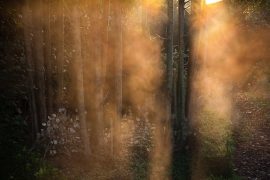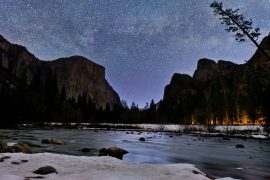How does language hook on to the world?
– Ludwig Wittgenstein
I walked to the edge and felt, no
knew I could go no further.
Between us there is a welcome chasm.
Take this river where, for so many years, I fished.
From the shallows I can cast out
into the current beyond the shelf,
mend the line, and let my dry fly with a nymph
dangling drift into the eddy downstream,
out of the light and under the trees,
where I see them rising evening after evening,
the tug, the flick that sets the hook,
the careening downstream the leap the flailing,
the whine of the reel running into the backing,
and then the joyful struggle—until
one day I sat on the bank and imagined it,
and regretted all the pain I had caused,
regretting the joy I took in causing harm;
the voice from the radio I kept on for company
implored—implored what, exactly?
The point of this remote place is the distance
we keep from others that not one of us begrudges;
we are strangers to each other,
and we wouldn’t have it any other way.
No one aloud or in private wonders
why I no longer wade above the shady places,
or wait for dusk and cast from shore
into the shallows; at dusk ornery rainbows
venture out from beneath the shelf,
but it was the reel that screamed
when they were hooked, not they.
No one wonders why I don’t regale
them with the stories of their capture or escape;
we are incurious about our neighbors.
Even if our bumpers touch
at the gas station, and even if we rehash
this inadvertent unintentional contact in detail
we remain, by consent, remote. Neither their words
nor the world can get their hooks into me
as we contemplate this ongoing drought
that brought the deer out of the woods into the streets,
and the rattlers to the banks of the river.
Their rattles’ incessant warning makes me think
they are at home among us.





